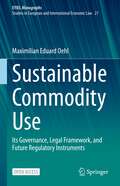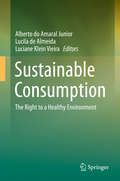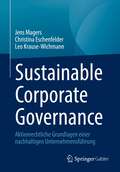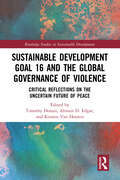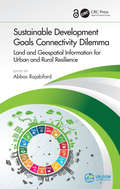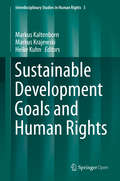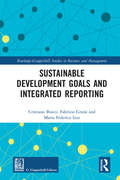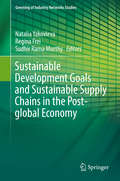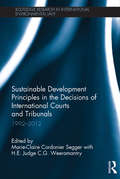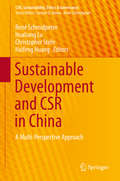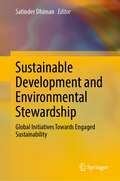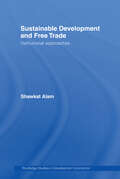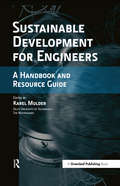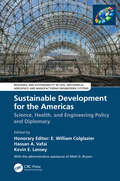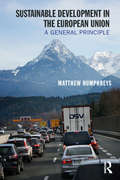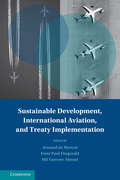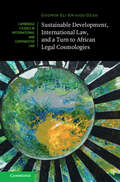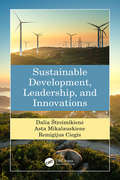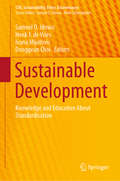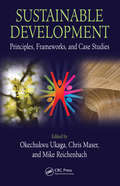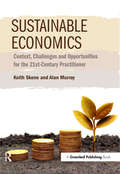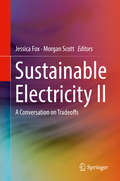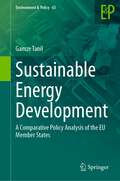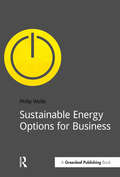- Table View
- List View
Sustainable Commodity Use: Its Governance, Legal Framework, and Future Regulatory Instruments (European Yearbook of International Economic Law #21)
by Maximilian Eduard OehlThis open access book examines the governance and legal landscape of the global commodity sector. For that purpose, the author conceptualises both Global Commodity Governance (GCG) as well as Transnational Commodity Law (TCL). He defines the key terms of Global Commodity Governance, delineates the underlying legal framework of Transnational Commodity Law, and assesses the effectiveness of Transnational Commodity Law in fostering a functional commodity sector. “Sustainable Commodity Use” is based on a comprehensive analysis of over 250 international agreements, standards, and guiding documents. The author distils the main findings into a conceptualisation of Transnational Commodity Law and provides the reader with a succinct overview of its normative configurations as well as regulatory gaps. Moreover, he elaborates a taxonomy of International Commodity Agreements. In addition, an outline of the normative substance of Transnational Commodity Law features in an appendix to the main text. The author concludes by making concrete suggestions on how rules regulating commodity activities de lege ferenda could and should be designed to improve the effectiveness of law regulating transnational commodity activity. In doing so, he demonstrates the application of the sustainable use principle as the overall objective and purpose of Transnational Commodity Law and discusses International Commodity Agreements as future regulatory instruments. This book may assist lawmakers, practitioners, civil society advocates, and academics worldwide in developing a legal framework for sustainable global commodity activity.
Sustainable Consumption: The Right to a Healthy Environment
by Lucila De Almeida Alberto do Amaral Junior Luciane Klein VieiraThis book provides a broad understanding of whether law plays a role in influencing patterns of sustainable consumption and, if so, how. Bringing together legal scholars from the Global South and the Global North, it examines these questions in the context of national, transnational and international law, within single and plural legal systems, and across a range of sector-specific issue areas.The chapters identify how traditional legal disciplines (e.g. constitutional law, consumer law, public procurement, international public law), sector-related regulation (e.g. energy, water, waste), and legal rules in specific areas (e.g. eco-labelling and packing) engage with the concept of sustainable consumption. A number of the contributions describe this relationship by isolating a national legal system, while others approach it from the vantage point of legal pluralism, exploring the conflicts and convergences of rules between multiple international treaties (or guidelines) and those between the rules of international and transnational law (or both) vis-à-vis national legal systems. While sustainable consumption is recognised as an important field of interdisciplinary research linking virtually all social science disciplines, legal scholarship, in contrast, has neglected the importance of the field of sustainable consumption to the law. This book fills the gap.
Sustainable Corporate Governance: Aktienrechtliche Grundlagen einer nachhaltigen Unternehmensführung
by Jens Magers Christina Eschenfelder Leo Krause-WichmannDas Buch vermittelt kompakt und verständlich die wichtigsten rechtlichen Aspekte einer nachhaltigen Unternehmensführung bei einer Aktiengesellschaft deutschen Rechts. Beispiele aus der Praxis dienen zur Veranschaulichung. Dabei befasst sich das Buch mit zwei großen Themenkomplexen.Erstens: Wie können (und ggf. müssen) Vorstand, Aufsichtsrat und Hauptversammlung Sozial- und Umweltbelange fördern? Welche Rolle kommt ihnen dabei innerhalb der Organisationsverfassung zu und welche Möglichkeiten der Binnenorganisation erlaubt das Aktienrecht?Zweitens befasst es sich mit der Frage, wie der Gesetzgeber zur Einhaltung bestimmter Governance-Praktiken drängt. Welchen Anforderungen an Diversität und Fachkompetenzen müssen Mitglieder von Vorstand und Aufsichtsrat genügen? Welche Vorgaben bestehen für Nachhaltigkeitsparameter bei der Vergütung des Vorstands?Die Autoren vermitteln einen Überblick über die einschlägigen rechtlichen Grundlagen und zeigen fundiert die wesentlichen Themen einer Sustainable Corporate Governance nach deutschem Aktienrecht auf.Der InhaltBegriffsklärungenCorporate Governance KodizesCodes of Conduct und ComplianceDer VorstandDer AufsichtsratDie HauptversammlungDiversitätKompetenzenVergütung des Vorstands
Sustainable Development Goal 16 and the Global Governance of Violence: Critical Reflections on the Uncertain Future of Peace (Routledge Studies in Sustainable Development)
by Timothy Donais Alistair D. Edgar Kirsten Van HoutenThis book brings together a diverse range of scholars and practitioners working at the nexus of peace and development to reflect, at the mid-way point of the Sustainable Development Goals implementation period, what impact Goal 16 has made, or may yet make, toward reducing violence in ‘all its forms.’ Adopted in 2015, the Sustainable Development Goals include 17 objectives designed to shape and direct the global development agenda through to 2030, with Goal 16 aiming to promote ‘peaceful and inclusive societies for sustainable development.’ Amidst an ongoing global pandemic, evidence of a fracturing liberal international order, and the persistence of seemingly intractable conflict in large parts of the world, this volume takes stock of current progress toward providing access to justice and ensuring inclusive and democratic institutions. Across 15 chapters, the book’s contributors explore the universal aspirations of Goal 16 and its specific implications for conflict-affected states, which continue to experience ‘development in reverse,’ and for historically marginalized groups such as women, youth, the disabled, and indigenous peoples. In doing so, it offers a comprehensive assessment of Goal 16’s broader contribution to the creation of a more just, peaceful world against the realities of societies emerging from the COVID-19 pandemic and grappling with a deepening climate crisis. This volume will appeal to scholars, researchers, policymakers, and postgraduate students in sustainable development, global governance, international relations, global development, international law, and political science.
Sustainable Development Goals Connectivity Dilemma: Land and Geospatial Information for Urban and Rural Resilience
by Abbas RajabifardThe Open Access version of this book, available at https://doi.org/10.4324/9780429290626, has been made available under a Creative Commons Attribution-Non Commercial-No Derivatives 4.0 license. Large-scale migration from rural to urban areas, and between countries, affects sustainable development at local, national, and regional levels. To strengthen urban and rural resilience to global challenges, Sustainable Development Goals Connectivity Dilemma: Land and Geospatial Information for Urban and Rural Resilience, brings together leading international geospatial experts to analyze the role of land and geospatial data infrastructures and services for achieving the United Nations' Sustainable Development Goals (SDGs). While the goals outlined in the 2030 Agenda have been longstanding aspirations worldwide, the complexity and connectivity between social, economic, environmental, and governance challenges are changing with large-scale urbanization and population growth. Structured in 5 parts, the themes and objectives of the book are in line with the critical challenges, gaps, and opportunities raised at all UN-GGIM events and UN-GGIM Academic Network forums. Through the different perspectives of scholars, industry actors, and policy-makers, this book provides interdisciplinary analysis and multisectoral expertise on the interconnection between the SDGs, geospatial information, and urban and rural resilience. Sustainable Development Goals Connectivity Dilemma: Land and Geospatial Information for Urban and Rural Resilience is an essential reference for researchers, industry professionals, and postgraduate students in fields such as geomatics, land administration, urban planning, GIS, and sustainable development. It will also prove a vital resource for environmental protection specialists, government practitioners, UN-GGIM delegates, and geospatial and land administration agencies. Features: Introduces a holistic and new approach to sustainable development Brings together social, economic, and environmental dimensions of sustainability Highlights the significance and the role of geospatial information in sustainable development Examines urban and rural interdependencies in the context of strengthening resilience Written by experts with diverse academic and professional backgrounds who examine connectivity and develop strategic pathways
Sustainable Development Goals and Human Rights (Interdisciplinary Studies in Human Rights #5)
by Markus Krajewski Markus Kaltenborn Heike KuhnThis open access book analyses the interplay of sustainable development and human rights from different perspectives including fight against poverty, health, gender equality, working conditions, climate change and the role of private actors. Each aspect is addressed from a more human rights-focused angle and a development-policy angle. This allows comparisons between the different approaches but also seeks to close gaps which would remain if only one perspective would be at the center of the discussions. Specifically, the book shows the strong connections between human rights and the objectives of the 2030 Agenda for Sustainable Development and the Sustainable Development Goals adopted by the United Nations in 2015. Already the preamble of this document explicitly states that “the 17 Sustainable Development Goals ... seek to realise the human rights of all”. Moreover, several goals and targets of the 2030 Agenda correspond to already existing individual human rights obligations. The contributions of this volume therefore also address how the implementation of human rights and SDGs can reinforce each other, but also point to critical shortcomings of the different approaches.
Sustainable Development Goals and Integrated Reporting (Routledge-Giappichelli Studies in Business and Management)
by Cristiano Busco Fabrizio Granà Maria Federica IzzoOur planet faces massive economic, social, and environmental challenges. To deal with these challenges, the United Nations has promoted 17 Sustainable Development Goals (SDGs) to define global priorities and aspirations for 2030, and Governments worldwide have already agreed on these goals. In order to approach them practically, private and public organizations have to contribute to make SDGs happen by identifying and executing sustainable strategies as key drivers of their visions and business models. Building on the emerging concept of Integrated Thinking (IT), this book explores how modern organizations can leverage a long-term integrated strategy to reconcile financial stability with social and environmental sustainability and create enduring value for all stakeholders. By focusing on the value-creating role of business organizations in delivering on the promise of sustainable and inclusive development, the book enriches the debate on Integrated Thinking and Integrated Reporting (IR), with particular emphasis on the value creation process. This book offers an opportunity to discuss the way in which business organisations can rethink their management processes, accounting tools and reporting solutions, as they strive for both competitiveness and growth while contributing to the achievement of the SDGs, and long-term value creation more broadly. Based on the analysis of different case studies, the book explores how organizations are approaching these challenges and how they are connecting SDGs, to business models and strategies. Analysing the impact of SDGs on materiality, connectivity, and stakeholder engagement, this book provides an insight into how Integrated Thinking, Management and Reporting is currently practiced and in which way these managerial innovations can contribute to SDGs.
Sustainable Development Goals and Sustainable Supply Chains in the Post-global Economy (Greening of Industry Networks Studies #7)
by Natalia Yakovleva Regina Frei Sudhir Rama MurthyThis book presents a collection of studies on current best practices for delivering sustainable development policies within supply chains. It critiques the limitations of existing business theory and practice on sustainable supply chain management, and discusses opportunities for new conceptual models for businesses to engage with Sustainable Development Goals (SDGs). It examines how businesses can work towards implementing Sustainable Development Goals in the contexts of entrepreneurial initiative, industry collaboration and regional development. SDGs renew the sustainable development agenda for global communities and ask businesses and organisations to reset their sustainable development policies. A strategy to embed sustainable development principles into business operations along the supply chain operations, which has been a conceptual and, in many instances, practitioner, business and industry achievement of the past decades, is not enough to shift the economic and social conditions of poor populations around the world. How would the global supply chains of the future look like? What social relations does it envisage? How will businesses and organisations engage with societies, environments and complex institutional contexts in emerging markets and developing countries, which are faced with issues of population growth, needed leaps in infrastructure provision, educational and health improvements, cultural and institutional shifts? The books challenges current approaches to sustainable supply chain practices guided by discussion on SDGs. It reviews implementation issues of existing sustainable development approaches, assesses the advancement of sustainable development strategies and examines the opportunities for global value chains to increase their positive social and environmental inputs in regions, communities and organisations. The book collects both conceptual and empirical studies set in a variety of business and organisational contexts, such as manufacturing, retail, procurement, cities and industrial parks. It contests the accepted axioms of sustainable practices in the global supply chains and proposes new models for organisations and production networks to engage with societies and address market and production effects on communities and institutions.
Sustainable Development Principles in the Decisions of International Courts and Tribunals: 1992-2012 (Routledge Research in International Environmental Law)
by Marie-Claire Cordonier Segger Judge C.G. WeeramantryThe 2002 New Delhi Declaration of Principles of International Law relating to Sustainable Development set out seven principles on sustainable development, as agreed in treaties and soft-law instruments from before the 1992 Rio ‘Earth Summit’ UNCED, to the 2002 Johannesburg World Summit on Sustainable Development, to the 2012 Rio UNCSD. Recognition of the New Delhi principles is shaping the decisions of dispute settlement bodies with jurisdiction over many subjects: the environment, human rights, trade, investment, and crime, among others. This book explores the expanding international jurisprudence incorporating principles of international law on sustainable development. Through chapters by respected experts, the volume documents the application and interpretation of these principles, demonstrating how courts and tribunals are contributing to the world’s Sustainable Development Goals, by peacefully resolving disputes. It charts the evolution of these principles in international law from soft law standards towards recognition as customary law in certain instances, assessing key challenges to further judicial consideration of the principles, and discussing, for instance, how their relevance for compliance and disputes related to the 2015 Paris Agreement on climate change. The volume provides a unique contribution of great interest to law and policy-makers, judges, academics, students, civil society and practitioners concerned with sustainable development and the law, globally.
Sustainable Development and CSR in China
by René Schmidpeter Hualiang Lu Christopher Stehr Haifeng HuangThis book offers an in-depth analysis of Corporate Social Responsibility, gathering contributions by authors from various countries, cultures and political systems. It provides readers with a better understanding of the concept and its implementation in China by pursuing an international approach. The respective contributions examine Corporate Social Responsibility in terms of its close ties to ecology, corporate sustainability and the future of specific industries. The book is the product of two international meetings, the "Ecological Education and Sustainable Development Forum" in Chengdu, China, and the "CSR & Business Sustainability Development Forum" in Shenzen, China.
Sustainable Development and Environmental Stewardship: Global Initiatives Towards Engaged Sustainability
by Satinder DhimanThis book builds on recent advances in the theory of sustainable development and links it with environmental stewardship in a dialectical manner, as envisioned by global scholars in this emerging field. Environmental stewardship deals with practical issues of ecosystem management and governance to address changes in socio-ecological systems to sustain the supply and availability of ecosystem services by society. It means reducing our total footprint on the planet, not just carbon footprint. Truly global in scope, this volume is a humble offering of more than 12 scholars and practitioners from around the world to the exciting adventure of sustainable development and eco-stewardship. Featuring topics such as climate change, organizational sustainability, green innovation, and urban governance, this book is useful for policy makers, managers of NGOs, and sustainability researchers in developing engaging strategies for a more sustainable planet.
Sustainable Development and Free Trade: Institutional Approaches (Routledge Studies In Development Economics Ser.)
by Shawkat AlamExamining institutions rather than themes, this critical book provides a comprehensive survey of the inter-relationship between trade-induced economic growth and the environment and its impact on the global quest for sustainable development. Focusing in particular on the interests and concerns of developing countries and the skewing of internationa
Sustainable Development for Engineers: A Handbook and Resource Guide
by Karel MulderIt is crucial that engineers – from students to those already practising – have a deep understanding of the environmental threats facing the world, if they are to become part of the solution and not the problem. Is there a way to reconcile modern lifestyles with the compelling need for change? Could new improved technologies play a key role? If great leaps in the environmental efficiency of technologies are needed, can they be produced? Engineers are in a privileged and hugely influential position to innovate, design and build a sustainable future. But are they engaged or uninterested? Are they knowledgeable or ignorant? This book has been developed by a number of committed educators in European engineering departments under the leadership of Delft University of Technology and the Technical University of Catalunya to meet the perceived gap between what engineers know and what they should know in relation to sustainable development. The University of Delft decided as long ago as 1998 that all of its engineering graduates, working towards careers as designers, managers or researchers, should be prepared for the challenge of sustainable development and, as such, should leave university able to make sustainable development operational in their designs and daily practices. The huge amount of knowledge gathered on best-practice teaching for engineers is reflected in this book. The aim is to give engineering students a grounding in the challenge that sustainable development poses to the engineering profession, the contribution the engineer can make to attaining some of the societal and environmental goals of sustainability, and the barriers and pitfalls engineers will likely need to confront in their professional lives. Concise but comprehensive, the book examines the key tools, skills and techniques that can be used in engineering design and management to ensure that whole-life costs and impacts of engineering schemes are addressed at every stage of planning, implementation and disposal. The book also aims to demonstrate through real-life examples the tangible benefits that have already been achieved in many engineering projects, and to highlight how real improvements can be, and are being, made. Each chapter ends with a series of questions and exercises for the student to undertake. Sustainable Development for Engineers will be essential reading for all engineers and scientists concerned with sustainable development. In particular, it provides key reading and learning materials for undergraduate and postgraduate students reading environmental, chemical, civil or mechanical engineering, manufacturing and design, environmental science, green chemistry and environmental management.
Sustainable Development for the Americas: Science, Health, and Engineering Policy and Diplomacy (Resilience and Sustainability in Civil, Mechanical, Aerospace and Manufacturing Engineering Systems)
by E. William ColglazierEnvironmental sustainability efforts require a great deal of engagement and political will, ranging from local communities to state departments. Science diplomats—from experts and scientists to spokespersons and ambassadors—can help facilitate at all levels and yield valued resources from technology sharing, capacity building, and knowledge exchanges. This book explores the importance of sustained international scientific cooperation, building community resilience, and the role of political will in sustainability and diplomacy. It shows how even small diplomatic efforts can influence myriad issues, from overfishing to human rights negotiations to global carbon emission reduction. Features: • Examines various topics such as global climate change, arid environments, water security and governance, trans-boundary conflict and cooperation, urban and rural resilience, and public health. • Presents case studies from various geographic regions through the lens of diplomacy, including the US–Mexico border, the Gulf of California, South America, Europe, the Middle East, Central and South Asia, and China. • Discusses how building networks of people, organizations, and countries engaged in science diplomacy is crucial for mutual growth and for overcoming conflicting political stances. Sustainable Development for the Americas: Science, Health and Engineering Policy and Diplomacy provides a useful resource for diplomats, policymakers, students, and decision-makers. It provides numerous examples of how using science and technology for policy and diplomacy is essential to finding common ground among nations for a collective global benefit.
Sustainable Development in the European Union: A General Principle
by Matthew HumphreysThis book undertakes a critical appraisal of the concept of sustainable development in the European Union. In addition to existing issues of sustainability, it examines the development of a European "general principle" of sustainable development. This original, critical approach examines legal, political, and economic implications of the emergence of the principle and places the impact of such in local, national, intranational, and international contexts. While essentially focusing on the development of the principle, the discussion also includes a normative assessment of current policy and practice, and appraises European efforts in the light of international goals.
Sustainable Development, International Aviation, and Treaty Implementation (Treaty Implementation for Sustainable Development)
by Armand L.C. de Mestral P. Paul Fitzgerald Md. Tanveer AhmadIn 1944 the Chicago Convention set out the foundations of public international law regulating international air transport, but until 2016 no international agreement existed to limit its environmental impact. Sustainable Development, International Aviation, and Treaty Implementation explains why the CORSIA scheme adopted by the International Civil Aviation Organization in 2016, should be implemented in 2020 even though the adequacy of this scheme is still open to doubt and criticism. This book seeks to examine the many dimensions of the effort to contain greenhouse gas emissions from aircraft in a manner consonant with the principles of sustainable development, and examines the development of international law and policy in an area that has remained largely outside the general framework of international environmental law. International civil aviation is a significant polluter of the atmosphere, and in this volume, a group of air law and sustainable development law specialists considers how the international community can respond.
Sustainable Development, International Criminal Justice, and Treaty Implementation
by Marie-Claire Cordonier Segger Sébastien JodoinInternational Criminal Justice and Sustainable Development provides a serious and timely perspective on the relationship between two important and dynamic fields of international law. Comprised of chapters written by leading academics and international lawyers, this book examines how the principles and practices of international criminal law and sustainable development can contribute to one another's elaboration, interpretation, and implementation. Chapters in the book discuss the potential and limitations of international criminalization as a means for protecting the basic foundations of sustainable development; the role of existing international crimes in penalizing serious forms of economic, social, environmental, and cultural harm; the indirect linkages that have developed between sustainable development and various mechanisms of criminal accountability and redress; and innovative proposals to broaden the scope of international criminal justice. With its rigorous and innovative arguments, this book forms a unique and urgent contribution to current debates on the future of global justice and sustainability.
Sustainable Development, International Law, and a Turn to African Legal Cosmologies (Cambridge Studies in International and Comparative Law)
by Godwin Eli DzahThis original book analyses and reimagines the concept of sustainable development in international law from a non-Western legal perspective. Built upon the intersection of law, politics, and history in the context of Africa, its peoples and their experiences, customary law and other legal cosmologies, this ground-breaking study applies a critical legal analysis to Africa's interaction with conceptualising and operationalising sustainable development. It proposes a turn to non-Western legal normativity as the foundational principle for reimagining sustainable development in international law. It highlights eco-legal philosophies and principles in remaking sustainable development where ecological integrity assumes a central focus in the reimagined conceptualisation and operationalisation of sustainable development. While this pioneering book highlights Africa as its analytical pivot, its arguments and proposals are useful beyond Africa. Connecting global discourses on nature, the environment, rights and development, Godwin Eli Kwadzo Dzah illuminates our current thinking on sustainable development in international law.
Sustainable Development, Leadership, and Innovations
by Dalia Streimikiene Asta Mikalauskiene Remigijus CiegisThis book deals with the main challenges of sustainable development and the role of sustainable business and corporate social responsibility in implementing these challenges through sustainable leadership and innovations. It includes the economic, social, and environmental dimensions of sustainability and emphasizes the importance of achieving a socio-environmental balance in society. The theoretical frameworks and insights from sustainable development implementations on macro and micro levels, as well as the practical examples and case studies provided to introduce the concept of sustainable leadership and its impact on sustainable business development, are a scientific novelty in the field of sustainability. The book is comprised of six interconnected chapters that sequentially reveal the principal provisions of sustainable development, corporate social responsibility, and sustainable leadership, together with their correlations. Features: • Provides cutting-edge examples and case studies of sustainable leadership, viewed as the most significant means for the creation of sustainable organizational culture • Includes case studies on the economic, social, and environmental dimensions of sustainability • Addresses scientific aspects of sustainable development and its challenges • Discusses issues of sustainable development at different scales, ranging from macro to mirco levels • Provides policy implications for sustainable business development The theoretical framework and practical case studies presented in Sustainable Development, Leadership, and Innovations make it an invaluable resource and guide to both the academic and business communities. Business leaders, policy makers, and other professionals, as well as academics and graduate students, will all benefit greatly from this text.
Sustainable Development: Knowledge and Education About Standardisation (CSR, Sustainability, Ethics & Governance)
by Samuel O. Idowu Henk J. de Vries Ivana Mijatovic Donggeun ChoiThis book examines education about standardization in the context of sustainable management. It shows the role of standardization education in the global economy, and in markets, industries and businesses. The book presents knowledge on standardization for sustainable management, describes measures that can be taken to stimulate it, and highlights strategies for teaching and disseminating the concept. Subsequently presenting a number of best practices and case studies, the book seeks to align theory and practice. For researchers, this is the first academic publication that interconnects the concepts of sustainability, standardization and education. For professionals in the area of sustainability it shows that standardization is an essential instrument for enhancing sustainability for which proper education is needed. For standardization professionals the book reveals the links to sustainability and it shows not only the importance of education about standardization but also how this can be organized, and finally, for universities, the book shows that standardization deserves to be included in the curriculum, and it provides guidance and best practice examples about how this can be done.
Sustainable Development: Principles, Frameworks, and Case Studies
by Chris Maser Okechukwu Ukaga Mike ReichenbachCoined in the 1970s, the term sustainable development and the ideas behind it have enjoyed varying amounts of popularity over the years. And while dire predictions abound, the full impacts of global warming are not known, nor can they be known. What we do know is that to be sustainable, all societies must adjust to new realities, which include chan
Sustainable Economics: Context, Challenges and Opportunities for the 21st-Century Practitioner
by Alan Murray Keith SkeneThis book marks a milestone in Economics publishing. Sustainable Economics is *the* subject of the moment, as businesses across the globe face up to peak oil prices, climate instability, increasingly complex environmental legislation and the challenge of adapting to a new business landscape. Sustainable Economics: Context, Challenges and Opportunities for the 21st Century Practitioner debugs the language of sustainable development. It explores the strengths and weaknesses of the many and diverse schools of thought. The book enables the modern business student and practitioner to disentangle the complex, often convoluted debate relating to sustainability, and it provides the tools necessary to lead their organizations through the murky waters of current times and prepare for the challenges of the future. Eschewing the linear – take, make and waste – approach of current business and manufacturing thinking, this book revisits the ecological models underpinning recent economic sustainability theory, and re-examines the consequences of modern ecological thought upon business strategies relating to sustainability. A chapter is also dedicated to the "circular economy", already in common parlance at policy levels in the UK, and notably in China and other developing countries.Packed with the most recent research papers, Sustainable Economics is an essential resource for the 21st-century business practitioner and legislator.The book is supported with a large array of teaching and learning material, for both formal and informal use, ranging from role play to data analysis which are available on request with the purchase of this book.
Sustainable Electricity II: A Conversation on Tradeoffs
by Jessica Fox Morgan ScottRealities of power company choices, regulatory boundaries, and stakeholder approvals. Expectations of the responsible investor, environmental advocate, and Silicon Valley companies including Google, Facebook, and Stanford University. Surprising stories show how creativity, innovation, and planning can resolve some of the toughest choices facing electric power companies today, although not in all cases. Building on the first volume, Sustainable Electricity: Case Studies from Electric Power Companies in North America (Fox, 2016. Springer), this book dives headfirst into the economic, environmental, and social tradeoffs power companies face as they strive to be sustainable. With more than 40 contributing experts, chapters include first-hand power company stories, case studies of leading Silicon Valley organizations; socially responsible investor contemplations; environmental advocacy arguments; and regulatory realities. The book provides a window into the choices companies make, the tradeoffs stakeholders accept, and the bottom line that comes with producing sustainable electricity. It will be an important resource that will accelerate collective thoughts on what ‘sustainable electricity’ means and what needs to be considered when the “everyone wins” outcome is elusive. “People have been able to fish, hike, camp and boat on a beautiful AEP property that supports recreational activities for many years. Now AEP has to generate income from this property. Do we build roads and drill to extract the natural gas? Do we sell the timber and keep the property? Do we sell the whole thing? What about the fish, deer and other wildlife? Tradeoffs will be made, and not everyone will like them.” Tim W. Lohner, Ph.D., Environmental Specialist, American Electric Power. (Chapter 3) “Companies are demanding access to clean energy and investors are pressing companies to source 100% renewable. It is essential that utilities develop a comprehensive strategy to reduce climate impact, and clearly articulate the plan and their progress. Customers and investors want to see this progress, and utilities need to develop the right model for their particular business.” John Streur, CEO, Calvert Research & Management (Chapter 4) “At Chevron, we are continually examining the tradeoffs as we work to improve our energy efficiency and reduce our environmental footprint. The complexity of our global, shared challenge to electrify the world without undue compromise to the integrity of our planet is one that will require global action. The experiences and perspectives detailed in this book are important to understand as we collectively work towards a sustainable energy future. The one billion plus are counting on us.” Kirsten S. Thorne, Global Issues and Public Policy Manager, Chevron (Forward)
Sustainable Energy Development: A Comparative Policy Analysis of the EU Member States (Environment & Policy #63)
by Gamze TanilThis book investigates how the EU member states’ domestic energy policies have transformed in the last two decades as a consequence of horizontal and vertical integration forces. Integration is a dynamic process where member states adopt community rules, norms, and values, and meanwhile, learn from each other’s experiences. Today, Europe experiences an energy transition from fossil-fuels to cleaner sources of energy and European policy makers are committed to taking this significant step forward. Domestic structural change is, thus, observed in all member states‘ environmental and energy policies. This book presents an overview of the EU norms, legislation, and policy standards for renewable energies and analyses how member states transpose them into their domestic structure. The book also analyses the policy outcomes in the EU member states in a comparative perspective by using the most recent statistical data. This comparative analysis gives insight to investors and developers to decide on investment projects and/or manufacturing of renewable energy devices to these countries. It also provides a useful reference for policy makers, academics, students, and NGOs who need a quick overview of relevant national and EU legislation, policy standards, and policy outcomes.
Sustainable Energy Options for Business (Doshorts Ser.)
by Philip WolfeThe major environmental impact of most businesses derives from energy usage. The upside of this is that using energy more responsibly improves profitability. A business’s cheapest unit of energy is also the one which is least damaging to the planet: the unit you don't use.There are many ways to make your organization's energy usage more sustainable. In Sustainable Energy Options for Business, Philip Wolfe outlines the best available options for (1) reducing energy use and (2) improving the sustainability of energy supply. After an introduction to regulatory drivers and management issues, Wolfe looks at energy opportunities in five key areas: 1. Saving on energy usage; 2. Finding more sustainable sources of energy; 3. Generating renewable electricity; 4. Producing renewable heat; 5. Indirect energy sustainability options.Also included: An "energy checklist" to help identify your best options and important quick wins, plus a handy reference list, signposted from annotations in the text.
